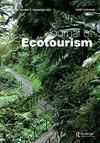Outdoor tourism to escape social surveillance: health gains but sustainability costs
IF 2.4
Q2 HOSPITALITY, LEISURE, SPORT & TOURISM
引用次数: 9
Abstract
ABSTRACT We analyse motivations and perspectives of outdoor tourists and tourism stakeholders in the Islamic Republic of Iran. We use semi-structured qualitative interviews, and interpretivist grounded theory, with basic and axial coding and fine-scaled differential narrative analysis. We distinguish three principal tourist segments, seeking: exhilaration through adventure; enjoyment of nature; and escape from cultural restrictions and associated social surveillance. The nature and adventure segments behave as ecotourists, and gain improved eudaimonic wellbeing. Nature tourists gain psychological restoration through calm and tranquil nature contemplation. Adventure tourists gain psychological recharge through challenge and achievement. The escape segment, in contrast, aims for hedonic wellbeing, is heedless of its social and ecological impacts, and does not behave as ecotourists. It adopts an ecotourism disguise, to avoid being observed as it flouts expected cultural norms. It uses unauthorised and clandestine logistics providers, creating substantial management obstacles for authorised commercial outdoor tour providers. Temporary escape from social surveillance generates mental health gains as a psychological safety valve for the tourists concerned, but their behaviour imposes unsustainable costs on local communities, natural environment, nature and adventure tourists, and outdoor tourism operators. These costs reduce the net social economic gains achieved from the mental health benefits of outdoor tourism.逃避社会监督的户外旅游:健康收益但可持续性成本
摘要:我们分析了伊朗伊斯兰共和国户外游客和旅游利益相关者的动机和观点。我们使用半结构化的定性访谈和基于解释主义的理论,以及基本和轴向编码和精细尺度的差异叙事分析。我们区分了三个主要的旅游板块,寻求:通过冒险获得刺激;享受自然;以及摆脱文化限制和相关的社会监督。自然和冒险部分表现为生态旅游者,并获得改善的生态健康。自然游客通过平静、宁静的自然沉思获得心理恢复。探险游客通过挑战和成就获得心理上的充电。相比之下,逃生部分旨在追求享乐幸福,忽视其社会和生态影响,并不像生态旅游者那样行事。它采用了生态旅游的伪装,以避免被忽视,因为它无视预期的文化规范。它使用未经授权的秘密物流提供商,为授权的商业户外旅游提供商制造了巨大的管理障碍。暂时逃离社会监督会为相关游客带来心理健康收益,作为心理安全阀,但他们的行为会给当地社区、自然环境、自然和冒险游客以及户外旅游经营者带来不可持续的成本。这些成本降低了户外旅游对心理健康的益处所带来的净社会经济收益。
本文章由计算机程序翻译,如有差异,请以英文原文为准。
求助全文
约1分钟内获得全文
求助全文
来源期刊

Journal of Ecotourism
Social Sciences-Geography, Planning and Development
CiteScore
6.40
自引率
12.50%
发文量
32
期刊介绍:
The Journal of Ecotourism seeks to advance the field by examining the social, economic, and ecological aspects of ecotourism at a number of scales, and including regions from around the world. Journal of Ecotourism welcomes conceptual, theoretical, and empirical research, particularly where it contributes to the dissemination of new ideas and models of ecotourism planning, development, management, and good practice. While the focus of the journal rests on a type of tourism based principally on natural history - along with other associated features of the man-land nexus - it will consider papers which investigate ecotourism as part of a broader nature based tourism, as well as those works which compare or contrast ecotourism/ists with other forms of tourism/ists.
 求助内容:
求助内容: 应助结果提醒方式:
应助结果提醒方式:


